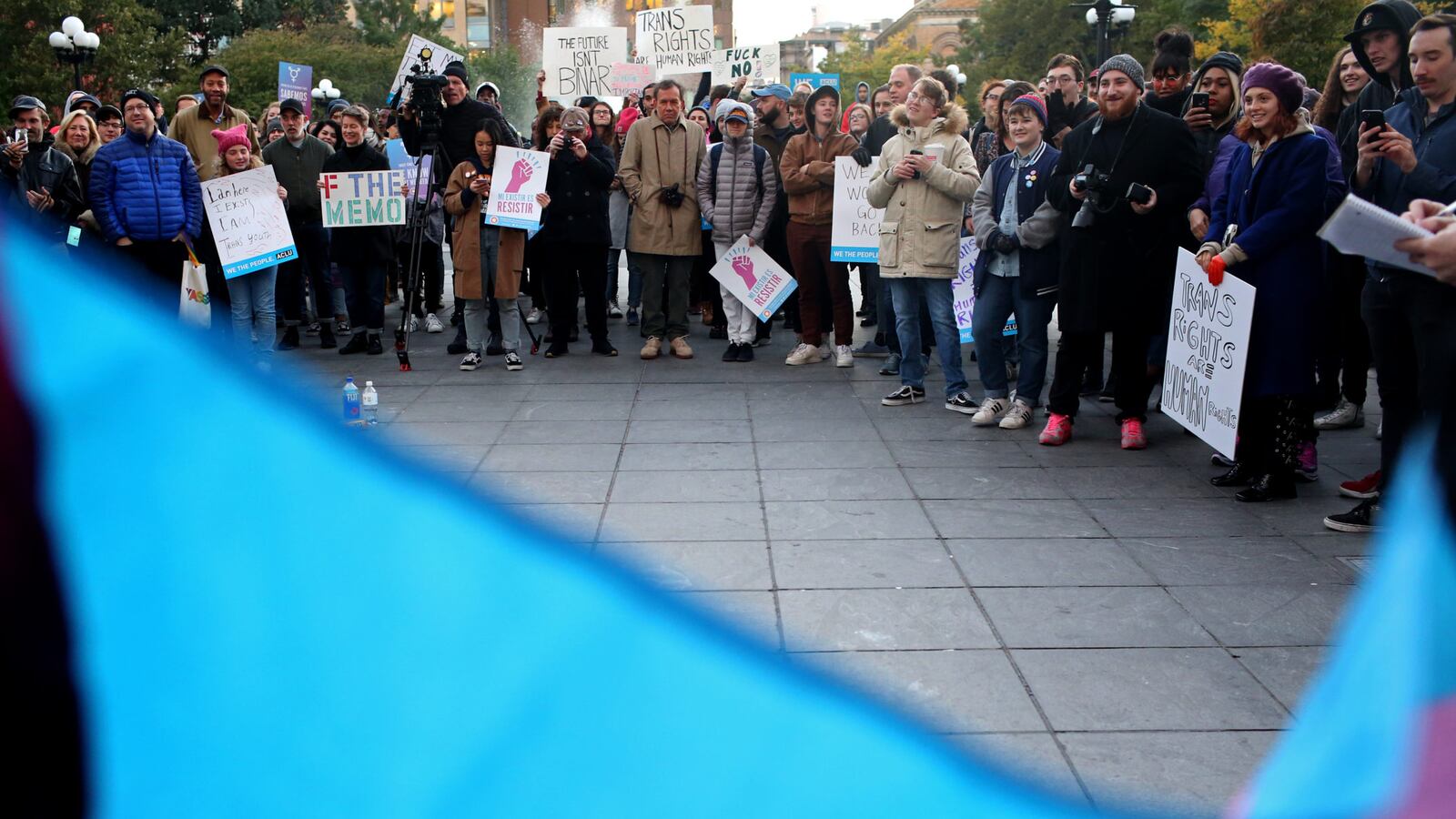Soon after news broke that the Trump administration could further roll back civil rights protections for transgender students, one New York City teacher sent an email blast to her fellow educators.
She was searching for materials to use in biology class that reflect people of different gender identities, but couldn’t find anything.
Many city educators may similarly grapple with how to support transgender students after it was reported that the Trump administration is considering whether to narrowly define gender based on a person’s biology at birth — a move that could have implications for how sex discrimination complaints in schools are handled under federal Title IX.
Olin Winn-Ritzenberg — a social worker at the Lesbian, Gay, Bisexual and Transgender Community Center — has some tips for navigating the questions and emotions this latest proposal might surface. He runs a support group for transgender teens and their peers who want to be allies, and says the most important advice is to just be willing to talk and listen.
“I don’t think it’s the kind of thing that you want to wait until somebody is in crisis,” he said. “By bringing it up ourselves, we’re modeling support.”
Here’s what he had to say about recognizing transgender students, the protections that New York City and state offer, and some mistakes to avoid.
This interview has been edited for length and clarity.
What are your tips for how to explain the news to students and young people?
If it’s news like this, that’s hard to maybe pin down what it exactly means (this was a memo, and does it have teeth? What does it mean?) I would look to them for the feeling of it. That’s what’s really important and a lot of what’s going on is just fear mongering, and a denial of trans existence. And that is something our young people will be able to speak to, to no end, and that they’re not strangers to — especially under this administration.
I would want to help ground things and offer some reassurance that a memo doesn’t have teeth and that we can look to our local New York City and state protections — that we’re lucky to live in a place that has such strong protections, especially for students.
What kinds of protections should New York City students expect to have in schools?
A student in New York City could expect to use the facilities that align with their identity, and could expect to possibly see all-gender facilities in their schools — as there are more and more of those being converted. They can expect to be able to file or register a complaint of discrimination against other students or even staff, and can expect to have an LGBT liaison within the Department of Education. They can expect to have their name and pronoun respected and utilized, and come up with a plan with a staff member around, if they’re transitioning socially or in any form at school, how they would like to be supported and how that looks in each unique situation.
It doesn’t always happen. But the fact that we do have it in policy means that there’s a means to pursuing it and that the institution is on the side of the trans or gender non-conforming student and would help to rectify any situation that’s feeling unsafe or unsupportive.
How can teachers and adults show support for their transgender students right now?
I don’t think it’s the kind of thing that you want to wait until somebody is in crisis. It shouldn’t be necessarily on any student to bring it up. By bringing it up ourselves, we’re modeling support. Even though this is a memo and we’re all waiting to see what they’re going to try to do with it, we know the intentions behind it…
I think we can speak directly to that and not make the debate about, ‘Is there or isn’t there a trans experience?’ That’s maybe one of the most powerful things. Yes, we exist. And if you’re an ally: ‘I’m a witness. You exist. You’re valid and as valid as anybody else.’
What would that validation look like in a school setting, say, if you’re a math teacher?
I think that making things visible is powerful. So if there’s a public bulletin board in a hallway and it says, ‘We stand with our trans staff and students,’ and then people have an opportunity to sign it.
I really think it can be an individualized response by a school depending on that school’s culture and if there is leadership by students, say, ‘We would like to be vocal and explicit in our support. You come up with the idea.’ Or, not to put it on them but say, ‘We’d love to be guided or get input from you on how to do that,’ so it is, wherever possible youth and trans-led.
Say, ‘What do you need and what can we provide?’
What should teachers and adults avoid saying or doing at a time like this?
I think a common, misguided mistake — that’s not necessarily hateful, but is really harmful nonetheless — is propping up a debate that’s going to hinge on ‘Do trans people exist?’ Or, ‘Defend or argue against sex being a binary, scientific, biological basis to view narrowly.’
If a teacher wanted to engage with this but the assignment were more like, ‘What are your thoughts,’ there is so much education that needs to be done first — and that can put a person’s very identity and being up for debate in a classroom setting.
Another really bad thing would be just to ignore it because people are maybe scared of going there or don’t know what to do.

